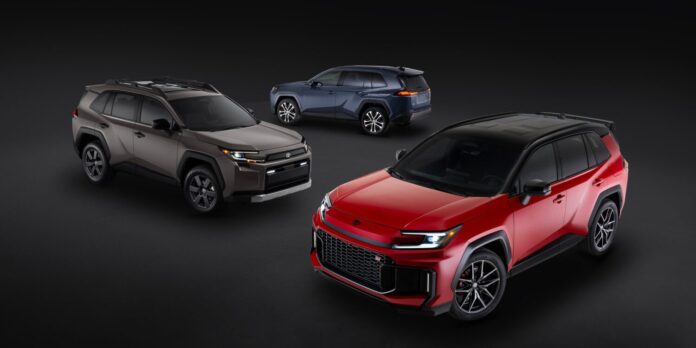Toyota USA has refreshed its RAV4 for 2026, and, in a significant step forward for efficiency, Toyota has axed the non-hybrid version of the vehicle. The RAV4 will now only be available in HEV and PHEV versions starting in the 2026 model year.
However, in an act of greenwashing reminiscent of many things Toyota has done before, it’s confusingly calling its vehicles “100% electrified” – despite that every single RAV4 includes a gas engine.
The improvements include new looks and trim lines, including an outdoorsy Woodland model (like the bZ just got) and a higher-performance “GR SPORT” model (though, we must remind everyone, that SUVs are not sportscars and will never be sportscars), and higher power from both PHEV and HEV models.
The PHEV model also boasts improved range, bumped from 42 miles to 50 miles – still lower than we’d typically consider worthy of coverage on Electrek, but the number is at least usable to keep the average driver on electric power for most of their daily driving (if they bother to plug it in).
Some trims will have DC fast charging, and you’ll be able to charge from 10-80% in 30 minutes.
Notably, the RAV4 no longer includes any option for a non-hybrid powertrain. All trims are either hybrid or plug-in hybrid. Previously, it had been anticipated that an EV model might join the lineup, but it looks like Toyota is just sticking with the newly-renamed bZ model for that purpose.
Toyota calls its new RAV4 options “highly efficient electrified powertrains,” but did not specify anticipated EPA mileage numbers for the HEV model, or for the PHEV when operating on gas power. The current RAV4 hybrid gets 39mpg (that’s about 10mpg better than the non-hybrid), and we would imagine something in that ballpark for the updated model.
The 2026 RAV4 will be available in Toyota dealerships across the US “later this year.” Pricing has not yet been announced.
Electrek’s Take
But the real issue here is the use of the word “electrified,” and specifically, “100% electrified.”
Toyota has a long history of deceptive advertising when it comes to its electrification efforts. Its lies have gotten it in trouble before, both in Norway and in the US.
Toyota is also the largest auto industry funder of climate denial, and has consistently ranked as the worst auto industry lobbyist on climate policy worldwide.
So its use of the word “electrified” should be looked at with some skepticism, since the company has used it before to confuse consumers into thinking that its vehicles are more efficient than they really are. For some previous coverage on that, see the FTC complaint filed against Toyota over its false electrification claims.
In this case, Toyota has upped the ante, not just claiming that its vehicles are electrified, but “100% electrified.”
There are a lot of terms that get used confusingly in the EV industry, oftentimes purposefully, in order to greenwash companies’ efforts. EV, PHEV, EREV, FCEV, HEV, BEV, electrified, all-electric, and so on.
But one thing that has heretofore been reserved for models that do not include a gasoline engine is any variation on “all-electric,” “100% electric,” “fully electric” or the like.
So, moving from “electrified” to “100% electrified” certainly seems like intentional phrasing by Toyota here. “Electrified” was already questionable, but “100% electrified” is well over the line.
So despite that we should be happy about a step-change improvement in powertrain availability on the RAV4, and the elimination of the non-hybrid model, Toyota just had to play one of its tricks and remind us why they’re the greatest enemy of electrification in the auto industry (well… save one).
Charge your electric vehicle at home using rooftop solar panels. Find a reliable and competitively priced solar installer near you on EnergySage, for free. They have pre-vetted installers competing for your business, ensuring high-quality solutions and 20-30% savings. It’s free, with no sales calls until you choose an installer. Compare personalized solar quotes online and receive guidance from unbiased Energy Advisers. Get started here. – ad*
FTC: We use income earning auto affiliate links. More.


